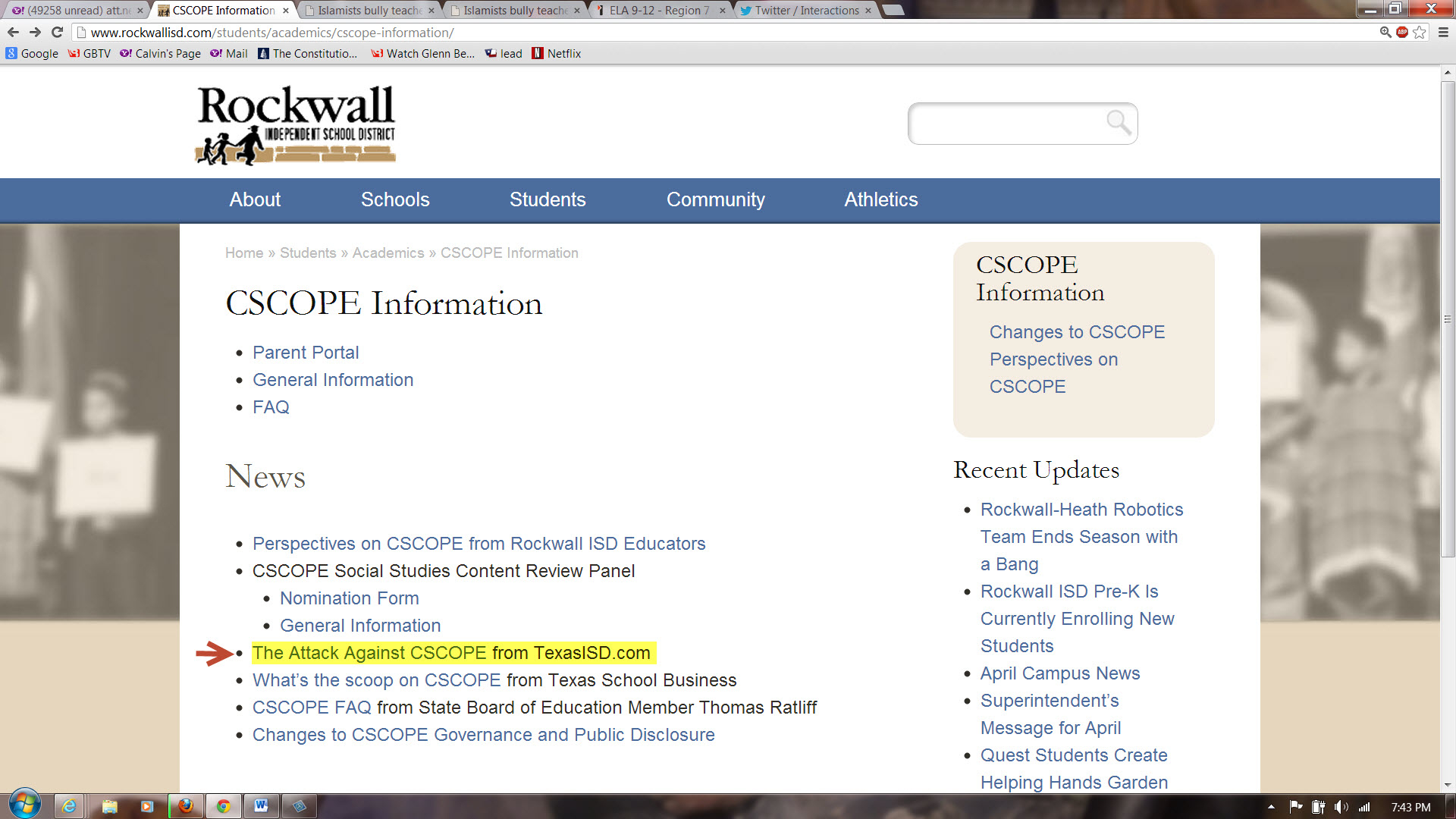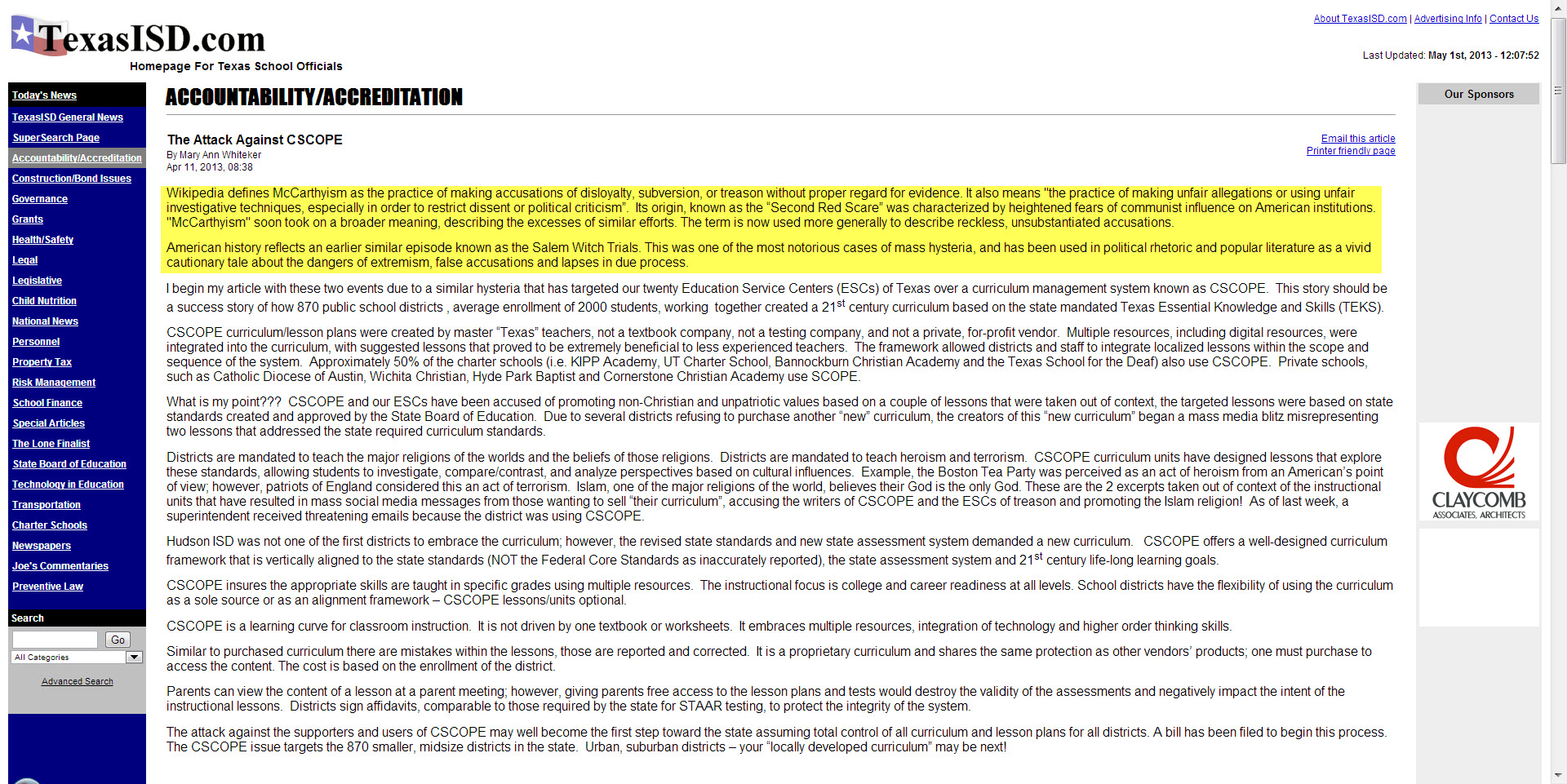by Donna Garner

8.25.13
Below are a few of my thoughts on the CSCOPE debate last night between Sen. Dan Patrick vs. Thomas Ratliff (ineligible member of the Texas State Board of Education). It was evident to me that Sen. Dan Patrick won the debate.
CAST OF CHARACTERS
Represented grassroots citizens: Sen. Dan Patrick (chair of Senate Education Committee/running for Lt. Gov.) defended the right of parents and the public to see the curriculum 24/7 that is being taught to public school children. Sen. Patrick is concerned about the millions of public dollars spent by the Education Service Centers on CSCOPE without their following the proper bidding and contractual processes.
Represented the education establishment: Thomas Ratliff is a millionaire lobbyist for Microsoft who has cultivated relationships with the education establishment for 15 years to get them to buy his products. Obviously he is going to take a position that supports the administrators who control the purse strings of local school district funds for vendor expenditures.
Represented the education establishment: Mary Anne Whiteker was a pro-CSCOPE panelist, is the superintendent of Hudson ISD, and is president of the Texas Association of Community Schools (TACS).
Represented the grassroots citizens: JoAnn Fleming was a second panelist. She was chosen because of her strong support for the Constitution; and as the Executive Director of Grassroots America, she believes strongly in the rights of “We the people” to direct the education of their children.
TWO DOCTORAL PAPERS USED TAKS DATA – NOW OUTDATED
During the debate, it was Thomas Ratliff and Mary Ann Whiteker who sought to support CSCOPE by criticizing a report done by E. W. Burt (Business/Marketing teacher in Blanket ISD) in which his students compared CSCOPE schools’ STAAR/End-of-Course scores with state averages.
After repeatedly trashing Burt’s creative classroom assignment which captured a teachable moment for his students, Ratliff/Whiteker lauded two doctoral studies on CSCOPE done by students at Texas Tech and Baylor University.
I found the two doctoral studies by doing an Internet search. Both dissertations used TAKS data which means the conclusions from those two doctoral studies are completely irrelevant to today’s discussions. The TAKS tests were built upon the “old” TEKS curriculum standards (1997), and those standards and TAKS tests are a thing of the past:
Texas Tech University Libraries – CSCOPE Search –– http://repositories.tdl.org/ttu-ir/bitstream/handle/2346/45242/SPINN-DISSERTATION.pdf?sequence=1
(2) Gaylon Craig Spinn – “Instructional Leadership: The Efficacy of Student Performance with CSCOPE Curriculum Implementation” – Abstract page ix:
“The purpose of this study was to evaluate, via latent growth modeling, the effects of CSCOPE curriculum implementation upon student academic performance in mathematics as measured by the Texas Assessments of Knowledge and Skills (TAKS) tests.”
===========
BEARdocs – Baylor University — Electronic Theses and Dissertations — https://beardocs.baylor.edu/xmlui/handle/2104/8231
“CSCOPE’s effect on Texas’ state mandated standardized test scores in mathematics” by Brent Ross Merritt
“The purpose of the study was to examine standardized test scores of school districts in the state of Texas that have implemented CSCOPE…in an effort to determine what effect, if any, its implementation has had. The standardized test used in the state of the Texas is titled the Texas Assessment of Knowledge and Skills (TAKS). This study used a sample size of 56 school districts and included test scores from over 125 individual campuses. Archival TAKS data were collected from the 2007-2008, 2008-2009, and 2009-2010 school years for grades 3-8…”
E. W. BURT’S REPORT BASED UPON CURRENT STAAR/END-OF-COURSE DATA
On the other hand, E. W. Burt’s report was current because it was done on the new STAAR/End-of-Course test data (see Burt’s comments posted further on down the page). Sen. Dan Patrick praised E. W. Burt and his students for their hard work and for the relevancy of their report.
To prove whether or not the CSCOPE lessons effectively raise academic achievement, the data must come from the STAAR/EOC tests given in School Year 2011-12 and School Year 2012-13 – the only two years from which we have tests aligned with the SBOE-approved TEKS (adopted from May 2008 – July 2012).
If Ratliff/Whiteker were trying to use the two doctoral studies to prove that CSCOPE raises current academic achievement, their assertion was false because the TAKS data is completely out of alignment with the new TEKS. In fact, the TAKS tests have been widely discredited because of their mediocre-to-low rigor.
Saying that CSCOPE is a superior system because students scored high on the TAKS tests is like saying that high-school students are well-educated because they can read the children’s nursery rhyme “Little Bo Peep.”
The 1997 Type #2 TEKS/TAKS are completely different from the new 2008-2010 Type #1 TEKS/STAAR/EOC’s: http://educationviews.org/2-types-of-education-philosophies-chart/
TEXAS LAW
According to Texas law, school administrators should be using public dollars to purchase instructional materials that prepare students to learn the new SBOE-approved TEKS and the tests built upon them (STAAR/EOC’s – Type #1) – not the out-of-date TEKS and TAKS built upon a completely different philosophy of education (Type #2).
TYLER ISD – PROGRESS OR LACK THERE OF
Ratliff/Whiteker went on to assert that Tyler ISD students are benefiting from the use of CSCOPE based upon three years of test data. However, that data again was undoubtedly built upon the old TAKS and old TEKS because we do not have data for three years on the new STAAR/EOC’s – only two.
How did Tyler ISD students score on the 2013 Accountability Ratings released by the TEA on 8.9.13? The TEA’s data IS built upon the STAAR/EOC’s which are built upon the new TEKS. In other words, the following data is built upon the current law not upon obsolete tests and obsolete curriculum standards:
Here is the TEA link to use: http://ritter.tea.state.tx.us/perfreport/account/2013/statelist.pdf
EXPLANATION OF DISTINCTIONS
The three Distinctions columns are indicative of superior performance because they are based upon objective data that rates academic achievement (the primary goal of the public schools.) The campuses/districts are only compared with their same like-characteristic group of 40.
The first column under Distinctions means outstanding academic achievement in English/Language Arts/Reading.
The second column means outstanding academic achievement in Math.
The third column means the campus/district was in the Top 25% of schools among the 40 like-comparison group of campuses.
SUMMARY – TYLER ISD:
5 out of 26 Tyler ISD campuses (19%) received the harshest rating – Improvement Required.
Only 10 out of 26 Tyler ISD campuses received the Reading/ELA Distinction (62% did not).
Only 6 out of 26 Tyler ISD campuses received the Math Distinction (77% did not).
Only 7 out of 26 Tyler ISD campuses received the Top 25% Distinction (73% did not).
This tells me that for the multiple-thousands of dollars that Tyler ISD has spent on CSCOPE, the students’ STAAR/EOC scores do not show district-wide academic achievement.
WHITEKER’S HUDSON ISD
Now, how did Whiteker’s Hudson ISD do on the 2013 Accountability Ratings? Her district is a CSCOPE district just as is Tyler ISD. Surely as much as Whiteker seems to adore CSCOPE, every campus in her district must have received the three Distinctions, right? Not so —
If I were Whiteker, I would find it particularly alarming that the school in which the basis for all other success in reading/writing/spelling is set (W. H. Bonner Elementary School in Hudson ISD) did not receive a Reading/ELA Distinction. I believe this lack of prowess is due to CSCOPE’s lack of systematic instruction in phonemic awareness/phonics and in grammar/usage.
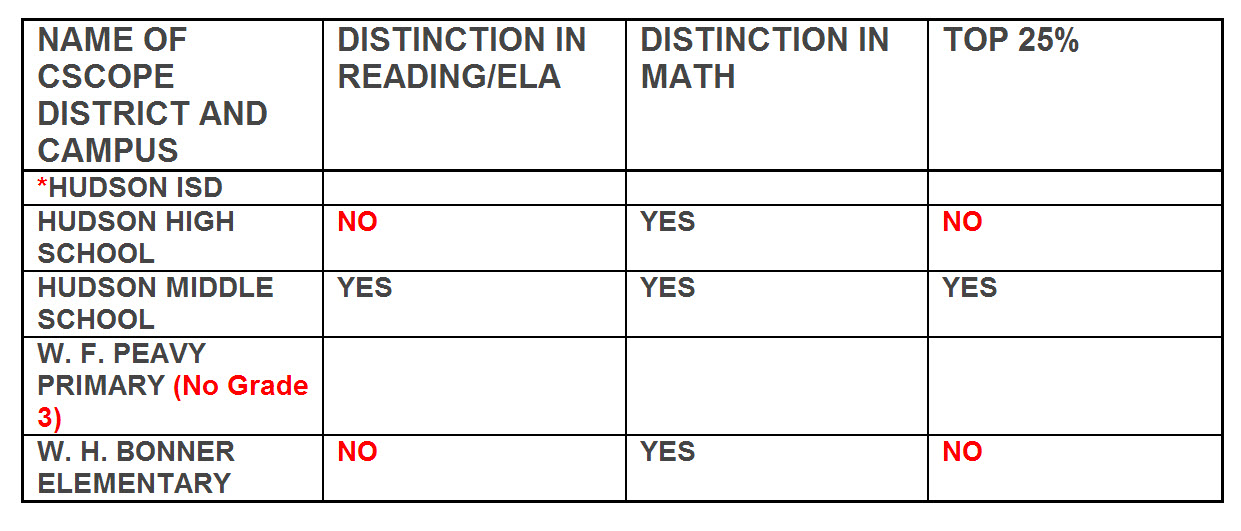
MORE SCHOOL ACCOUNTABILITY RATINGS
To view other CSCOPE school data pulled from the 2013 Accountability Ratings, please go to these links:
http://educationviews.org/proof-that-cscope-is-not-needed-valuable-links/
http://educationviews.org/cscope-the-truth-revealed-for-all-to-see/
===========
Sen. Dan Patrick repeatedly defended the work of E. W. Burt, a Texas classroom teacher who challenged his Marketing/Finance students with a real-world project:
CSCOPE REPORT — March 15, 2013
E. W. Burt, Business/Marketing Teacher
Blanket High School
Blanket, Texas
As a Texas high-school Business/Marketing teacher, I am to teach my students about spreadsheets according to the Texas Essential Knowledge and Skills (TEKS). I had been wanting to design a real-world unit for my students that would have high-interest level because of its practical applicability.
In class one day, a student asked, “What is CSCOPE?” That prompted me to create a unit in which my students could compare a topic after creating spreadsheets built upon factual data.
I said, “Let’s do a study comparing test scores of schools that use CSCOPE and ones that do not; then we can compare the outcomes.”
The students had no preconceived views but decided they would compare Algebra I, Biology, World Geography, and English Writing.
We acquired a list of STAAR/End-of-Course test scores (School Year 2011-12) published on the Texas Tribune’s public website in which they had downloaded the STAAR/End-of-Course data from Pearson. Next, we did a search online and found a list of schools in Texas that use CSCOPE.
These are the public website URL’s that the class used:
Link to STAAR/EOC 2011-12 Scores — http://www.texastribune.org/library/data/staar-district-results-2011-2012/
List of CSCOPE Schools: http://www.txcscopereview.com/2012/cscope-rotten-apple-award/
I divided the class into groups and divided up the list of CSCOPE schools among the class groups. The goal of each class group was to create a spreadsheet that compared the failure rate of CSCOPE schools with the failure rate of non-CSCOPE schools.
We did not pull a sample but attempted to list every ISD/CSD in the state. Each student’s work was checked by every other student.
The final study shows test outcomes in schools that use CSCOPE compared to schools that do not. We allowed the readers to draw their own conclusions.
This CSCOPE/STAAR/EOC unit utilized a teachable moment in my classroom in which I developed a hands-on learning experience using technology, the Internet, real-time data, spreadsheets, peer tutoring, group discussions, economics, career development, higher-level thinking skills, and statistical analysis.
*************************************************************
CSCOPE Study – Compiled by 9th Grade Business Class, Blanket ISD, Blanket, Texas
My business class asked me what CSCOPE is and if it works. I told them, “Let’s find out if schools that use CSCOPE score better or worse compared to schools that do not use it.”
To this end, we took a list of CSCOPE schools and a list of STAAR/End-of-Course scores (2011-12 School Year) from public schools statewide. Each class member took a portion of the more than 1,000 Texas public schools and recorded the STAAR/EOC test results on a spreadsheet. We compared Algebra I, Biology I, English Writing 1, and Geography. Here is what we found:
Percent of test takers scoring unacceptable on STAAR/EOC tests –
Algebra I
CSCOPE 20.35%
Non- CSCOPE 13.74%
48% more CSCOPE students scored unsatisfactory than Non-CSCOPE
Biology I
CSCOPE 14.86%
Non- CSCOPE 10.50%
42% more CSCOPE students scored unsatisfactory than Non-CSCOPE
English Writing I
CSCOPE 46.30%
Non- CSCOPE 39.48%
19.57% more CSCOPE students scored unsatisfactory than Non-CSCOPE
Geography
CSCOPE 23.30%
Non- CSCOPE 17.78%
37.06% more CSCOPE students scored unsatisfactory than Non-CSCOPE
Average 36.67% higher unsatisfactory rate among CSCOPE students on all tests
*Over 950 Texas ISDs surveyed
Data from
http://www.texastribune.org/library/data/staar-district-results-2011-2012/
http://www.txcscopereview.com/2012/cscope-rotten-apple-award/
E. W. Burt
Business Teacher
Blanket ISD
=============
MORE CSCOPE RESOURCES
8.19.13 – “CSCOPE: Change in Strategy” — http://educationviews.org/cscope-change-in-strategy/
==========
8.23.13 – “CSCOPE: A Texas Elementary Teacher Speaks” — http://educationviews.org/cscope-a-texas-elementary-teacher-speaks/
===========
8.20.13 – “Proof That CSCOPE Is Not Needed – Valuable Links” — http://educationviews.org/proof-that-cscope-is-not-needed-valuable-links/
============
8.22.13 – “Texas Tribune Publishes CSCOPE Lesson Plans” —http://educationviews.org/texas-tribune-posts-interactive-search-of-cscope-lesson-plans/
=========
8.22.13 — “Alice Linahan Show: Texas School Student Tells All, CSCOPE, STAAR/EOC’s” – link to podcast — http://soundcloud.com/alice-linahan/women-on-the-wall-1?utm_source=soundcloud&utm_campaign=share&utm_medium=twitter
=========
8.24.13 – From Mary Lou Bruner – as posted on Facebook, 4:12 A. M., Aug. 25, 2013
I attended the debate tonight in Tyler between Senator Dan Patrick and Thomas Ratliff. Senator Patrick is a Conservative Republican in the Texas Senate, and he is also chairman of the education committee. He is standing with Texas parents who have provided documentation that the CSCOPE lessons are biased and unpatriotic. Thomas Ratliff is a Republican on the State Board of Education in favor of the use of CSCOPE in Texas even though the State Board of Education has ruled that the school districts discontinue the use of CSCOPE lessons until an audit and an investigation into the program has been completed.
First of all it should be pointed out that the debate was not exactly held in a neutral place. It was held in at the University of Texas at Tyler where there is a building named after Thomas Ratliff’s father, and the debate was held in Tyler where Tyler ISD uses CSCOPE. Secondly it should be noted that Senator Patrick spoke first during the opening statement section of the debate. Therefore Patrick should have been given the last word in the summary portion of the debate. Senator Patrick pointed this out when the moderator told him to speak first during the summaries. It appeared that Thomas Ratliff agreed with Senator Patrick, but the moderator stepped in and said he wanted Senator Patrick to go first in the summaries and he wanted Thomas Ratliff to have the last word. This matter should have been decided by a coin toss before the debate began if the debate was completely fair because whoever has the last word has an advantage.
Also, there was an 800 pound gorilla in the room during the debate which was not even mentioned. Thomas Ratliff, a member of the State Board of Education, is a paid lobbyist. One of his most influential clients is Microsoft. Since CSCOPE has been used in Texas, Microsoft has tripled in sales in Texas. No wonder Thomas Ratliff is fighting to keep CSCOPE. CSCOPE helps his client, and when he makes money for his client he gets paid nicely. Also The SBOE has state tax money invested in companies and Microsoft has an unfair advantage knowing everything the SBOE is planning to do before other companies know. Thomas Ratliff should not be on the State Board of Education while he is a paid lobbyist. Thomas Ratliff rented a room in Austin during the Texas Legislative session and lobbied members of the Texas House and Texas Senate all through the legislative session. The SBOE members are not paid a salary for their work, so it is likely that Ratliff was paid by lobbyists to stay in Austin and lobby members of the Texas Legislature. IT IS AGAINST TEXAS LAW FOR THOMAS RATLIFF TO BE ON THE SBOE BECAUSE IT IS A CONFLICT OF INTEREST.
Now about the actual debate. Senator Patrick made his points that CSCOPE began illegally because CSCOPE was funded with tax money. But even though it was developed with tax money through the Regional Education Service Centers, a private company sold CSCOPE to the school districts for three times more than they should have paid for it. How did a private company get to sell CSCOPE if it was developed by the Regional Education Service Centers? This is what taxpayers want to know? Also, the school districts which used CSCOPE never took competitive bids on the very expensive curriculum before they bought it. School districts are supposed to get competitive bids on expensive items or they are supposed to make their purchases from a vendor list, approved by the state of Texas. When districts make their purchases from the approved vendor list, the state has done the work to make sure the prices are competitive. Districts don’t always have to take the lowest bid because quality and service should sometimes be considered, but they are required to get sealed competitive bids to try to get the taxpayers the best value for their tax money. IN MY OPINION, THE SCHOOL DISTRICTS WHICH USED CSCOPE WITHOUT TAKING COMPETITIVE BIDS BROKE THE LAW.
Senator Patrick also made the point that teachers and administrators signed a contract which said they could go to prison for revealing what is in the CSCOPE lessons. To view the lessons on-line a person had to have a password and parents were not given the opportunity to view lesson plans their children were being taught. Even the chair of the SBOE was denied access to see the lesson plans for six months. When a company goes to so much trouble to keep information hidden, it is natural to believe the company might have a good reason to keep their secret. Since all of the controversy, CSCOPE has placed the lessons on-line as public domain material so that anyone can see the lessons or use them. But it was not that way for 6 years and it was not that way until attention was called to the possible corruption, and PARENTS DEMANDED TO SEE THE LESSONS.
What CSCOPE is hiding is the fact that the lessons are written by a very liberal person who thinks globally very much like the Democrats in control of the government. In fact the lessons glorify the Democratic Party and use negative terms when discussing the Republican Party. The lessons glorify MULTICULTURALISM. This means the lessons infer no religion is any better than any other religion and no nation is any better than any other nation. But we know that is not true because some nations are very backward and their people are still living like people lived in the dark ages. And some barbaric religions such as Islam cut off hands, gouge out eyes, and stone women to death without a trial if they are suspected of adultery. In fact, Multiculturalism speaks positively of Islam but goes to great dept to demonize Christians for The Crusades and the witch hunts. I agree all history should be told even the part we are not proud of. But the truth should also be told about Islam and countries with dictators who tax starving people to the point they can hardly survive while the rulers live lavishly in castles hiring more personal servants and marrying more virgins.
CSCOPE TEACHES CHILDREN TO LOOK AT EVENTS FROM A GLOBAL PERSPECTIVE. IT DOES NOT TEACH CHILDREN TO BE PROUD OF THE USA OR THE CONSTITUTION AND DECLARATION OF INDEPENDENCE. CSCOPE TEACHES CHILDREN TO SEE THE WORLD FROM THE VIEWPOINT OF OTHER NATIONS. IN OTHER WORDS. WHY DO YOU THINK THE JAPANESE FELT JUSTIFIED IN BOMBING PEARL HARBOR? WHY DO YOU THINK THE BRITISH CONSIDERED THE COLONISTS AS TERRORISTS WHEN THEY REBELLED AGAINST THE RULE OF THE ENGLISH KING? Of course the CSCOPE lessons do not mention that the king of England was unfair and tyrannical; the CSCOPE lessons considered the Americans in the American Revolution as TERRORISTS just like THE TERRORISTS who flew airplanes into the Twin Towers on 09-01-01. THE MULTICULTURAL LESSON PLANS CONSIDER THE TEA PARTY PEOPLE AND OTHER PATRIOTIC PEOPLE AS TERRORISTS.
Both debaters said they were for local control but their definitions of local control were different. Thomas Ratliff defined local control as the local school district. He said the SBOE was trying to micro-manage and dictate what the local districts can and cannot teach, yet he demonized the Irving ISD because Irving threw out CSCOPE. Ratliff said Irving created a hardship for the teachers.
Senator Patrick defined local control as control of education by the parents and local taxpayers. He said parents should have a say in their children’s education and when they come to him with complaints that they are not allowed to see what their children are being taught he is going to listen to them. He said the legislature is elected to protect the people. He said that is his job.
Ratliff said an individual teacher can have a bad or biased lesson just as CSCOPE could have a bad or biased lesson. That is true, but if one teacher has a bad lesson that is just one class which is misinformed or indoctrinated. But CSCOPE fully intended to expand to the point that all or most school districts in Texas were using the CSCOPE lessons. When a bad or biased lesson was in CSCOPE it was being used by many districts and many students throughout the state were affected.
Local control is not the entire state of Texas choosing CSCOPE. Local control is local teachers developing their own lesson plans or partnering with other districts with similar backgrounds and sharing lesson plans to cut down on the work. Lesson plans should constantly be revised and upgraded and expanded as new information is found to make the lessons more interesting and more relevant.
CSCOPE is the easy way out for teachers who have been overburdened with a school curriculum which teaches to the tests. I sympathize with teachers. Teachers have a very difficult job. But CSCOPE, a global curriculum written by a person with a liberal bias is not the answer for Texas Schools. We need a curriculum which teaches our children to be proud of our country when it has done a great job. We also need a curriculum which teaches our children fundamental values of right and wrong.
We do not want our children to be taught there is no such thing as right or wrong, it all depends on a person’s perspective. That is what CSCOPE teaches subliminally.
Donna Garner
Wgarner1@hot.rr.com

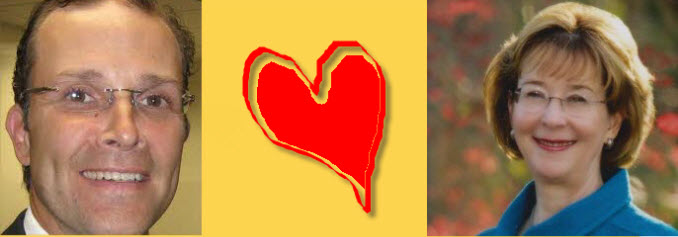

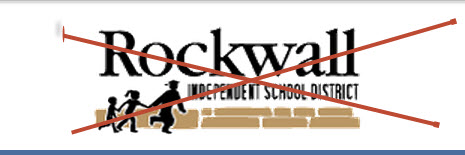
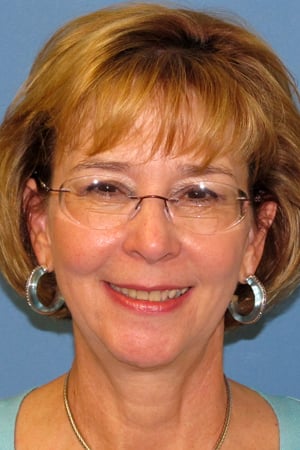 has written and posted an article on
has written and posted an article on 